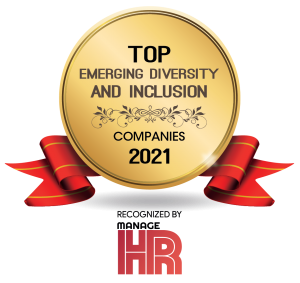Leaders rely heavily on their ability to retain top talent. A key factor influencing employee retention is something simple but important: The quality of everyday experiences on the job. These everyday experiences could include increased transparent communications, personalized developmental opportunities, employee recognition programs, and/or flexible work options.
Inclusive work environments that provide positive daily interactions and a strong sense of belonging can significantly impact the worker experience, engagement, and desire to stay with the organization. A McKinsey report demonstrates how organizations should be intentional about building a culture of inclusion and behaviours to model when effecting change. This article will discuss how a multi-faceted approach to inclusion can help businesses retain workers and ensure long-term success.
Creating an inclusive work environment requires organizations to identify the root causes of employee turnover and actively address the causes. Surface solutions are performative and do not lead to sustainable change. For example, Walmart created an initiative to improve social
mobility for employees through free education and upskilling. In conducting an equity and accessibility assessment of their processes, they uncovered that its frontline workers, 39 percent of whom identified as a Person of Colour (POC), were not securing higher-paying roles at the company. They also learned that this was due to the skill sets or degrees required to move up internally, and the prohibitive time commitment and cost needed to obtain those skill sets. Incorporating strategies that address root causes signals to the rest of the organization its seriousness and willingness to change.
As we delve deeper into this topic, we will explore the many dimensions of workplace inclusion, critical factors in retaining workers, and how partnering with coaching services, like Your Choice Coach, that help companies, non-profits, and government agencies foster a culture of inclusion to create an improved employee experience.
Creating a Thriving Inclusive Environment: Key Factors
To effectively retain workers and foster inclusion, businesses must consider a tailored approach, focusing on various crucial factors contributing to positive everyday experiences.
Inclusion Starts at the Top
Accountable and invested leaders are important for activation and embedding an inclusive culture change. Talk is cheap. There needs to be a deep commitment to ensure resources are aligned and realistic to effect change. Make DEI a core business priority. Hold leaders accountable for outcomes. All eyes are on you, so lead by example. Ensure sufficient resources are allocated such that there is a DEI line item in budgets, expertise is available to support, and there is a what by when timeline.
When leaders demonstrate a genuine commitment to inclusion, it ensures that these values penetrate deep into the organizational culture, leading to an environment where all employees feel respected and valued; and have a sense of belonging. For example, Consumer cosmetics company Shiseido accelerated their gender parity at board and executive management levels for women in the Japan office and in the local business community, through inclusive work policies, process redesign, upskilling, and community impact.
Understanding Lived Experiences
Gaining insights into employees’ lived experiences is vital for building an inclusive workplace that resonates with the workforce. To create policies and practices that genuinely impact employees’ daily experiences, organizations need to:
- Conduct employee surveys and focus groups, encouraging participation from their diverse employee groups.
- Gather feedback on existing policies to identify areas for improvement.
- Incorporate feedback into policy and practices and make revisions when appropriate.
- Regularly track the progress and impact of changes made to ensure intended outcomes are met.
Taking a proactive approach to understanding employees’ experiences can help organizations develop more targeted and effective strategies for fostering inclusion. For example,
Steel manufacturer Tata Steel launched an initiative to improve intersectional gender diversity for employees by addressing key root causes, including stereotypes and lack of support structures, legal and geographic constraints, enduring consequences of historic marginalization, non-inclusive policies, and unsafe work practices. The programs that resulted from this initiative included upskilling, career support, job opportunity creation, and inclusive redesign of policies and work infrastructure. An additional result was that they launched their first-ever transgender hiring program in India.
Keep Work Arrangements Flexible
Providing flexible work arrangements is one way to address diverse employee needs and create a more inclusive work environment. Flexible work policies, such as remote working, staggered hours, or job sharing, can create positive everyday experiences by accommodating various employee circumstances and preferences. To implement successful flexible work policies:
- Clearly define the expectations and guidelines for flexible work.
- Encourage communication and collaboration between team members.
- Utilize technology effectively to help manage and connect remote or flexible employees.
- Continuously monitor the impact of flexible work policies on employee satisfaction, work-life balance, and overall productivity.
For example, Randstad launched an initiative to support economic empowerment for at-risk women in the United States through upskilling and opportunity creation. The company tracked key performance indicators and participant feedback—including through one-on-one check-ins with participants at key stages of the program—to track participant completion rate and monitor program effectiveness. After the first year, Randstad added childcare and professional clothing to the program’s offerings after learning that participants needed these services to successfully complete the program and secure long-term employment. As a result of this initiative, the company supported at-risk women, with 95 percent of apprenticeship graduates advancing into long-term job opportunities through the program. Offering flexible work arrangements can enhance employee satisfaction, especially when businesses take the time to understand and address the unique situations and challenges their employees may face.
Communication flow is key
Promoting open communication is crucial for creating an inclusive workplace where employees feel valued, understood, and confident in expressing themselves. To foster an environment conducive to open communication:
- Model behaviours to demonstrate that all employee perspectives and feedback are welcome and valuable
- Provide opportunities for employees to voice concerns, raise issues, or propose new ideas.
- Encourage active listening and empathy from team members and leaders.
- Implement anonymous reporting options to allow employees to report any incidents they may be hesitant to disclose, for “safety” concerns, in a group or one-on-one setting.
An environment with high levels of psychological safety helps to promote open channels of communication to allow for opportunities to understand and collaborate with team members. Tell your teammates that you care about inclusion and ask for their feedback to help you improve. Listen actively by asking open-ended questions to help you understand before making a judgment. Use feedback channels and direct communication to make improvements. It will allow you to share your experiences, highlight barriers, and provide feedback on areas to improve upon.
Elevate Recognition & Rewards
Acknowledging and celebrating employee achievements is a crucial aspect of creating an inclusive work environment that empowers employees and drives retention. Effective recognition and reward systems can have a significant impact on workers’ everyday experiences, contributing to higher job satisfaction and loyalty. To develop a robust recognition and reward system:
- Leaders set the tone and ability to establish the team’s dynamics. Express gratitude and engage further when a team member challenges your thinking; encourage a learning mindset that allows mistakes to be made.
- Give credit to your team when you notice a new idea is being introduced. Remember to give credit to the original contributor.
- Create opportunities that allow for all team members to perform to their fullest potential
- Leverage non-monetary rewards, such as employee development opportunities or personalized recognition, to demonstrate genuine investment in employees’ futures.
By recognizing and rewarding employees’ efforts, organizations can drive engagement and foster a strong sense of belonging, boosting overall employee retention.
How Coaching Services Can Bolster Inclusion and Retention
Coaching services, like Your Choice Coach, can provide invaluable support to organizations aiming to create a workplace that fosters inclusion and retains talented employees. Offering expert guidance, resources, and personalized strategies, coaching services can help businesses identify gaps in their existing policies and practices, implement targeted solutions, and craft a thoughtful approach that ensures positive everyday experiences for workers are felt. By partnering with coaching services, organizations can benefit from a data-driven, tailored plan that accelerates their journey toward an inclusive workplace that thrives on employee satisfaction and long-term success.
Achieving Long-Term Success with Inclusive Workplace Strategies
Fostering inclusion and retaining workers in today’s dynamic business environment requires leaders to prioritize workers’ everyday experiences, demonstrate consistent commitment, and apply tailored strategies that cater to employees’ diverse needs. Are you ready to elevate your workplace into an intentional inclusive environment where every employee feels engaged and valued? Let Your Choice Coach help you develop and implement actionable strategies that create meaningful change and lasting impact. Reach out to us today for our inclusion coaching services and unlock the full potential of your organization through the power of holistic inclusion and employee retention initiatives!




